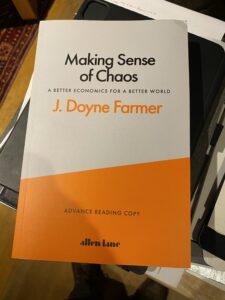The listening post

Dishes in Cambridge’s Lord’s Bridge radio telescope system: listening to the universe.
Quote of the Day
“He would have been considered a great Emperor, had he never ruled.”
- Roman historian Tacitus on the Emperor Galba
Musical alternative to the morning’s radio news
Van Morrison | Green Rocky Road
Long Read of the Day
The State of the Culture, 2024
Or a glimpse into post-entertainment society. (Spoiler alert: it’s not pretty)
Intriguing essay by Ted Gioia.
Here’s how it opens:
Until recently, the entertainment industry has been on a growth tear—so much so, that anything artsy or indie or alternative got squeezed as collateral damage.
But even this disturbing picture isn’t disturbing enough. That’s because it misses the single biggest change happening right now.
We’re witnessing the birth of a post-entertainment culture. And it won’t help the arts. In fact, it won’t help society at all.
Even that big whale is in trouble. Entertainment companies are struggling in ways nobody anticipated just a few years ago…
Read on. It’s good, particularly on how the Tec industry views ‘entertainment’, and where we’re headed.
Andrew Curry also had a nice commentary on it on his Substack.
Books, etc.

Sometimes, serendipity works. I’ve been brooding for ages about whether cybernetics and complexity science would be helpful in understanding the mess we’re in — which led to me re-reading Stafford Beer and other systems theorists. And then, out of nowhere, two interesting books pop up. This is the first one: Doyne Farmer is Professor of Complex Systems Science in Oxford but he’s also attached to the Santa Fe Institute. The book is out on April 25. The other book is The Unaccountability Machine: Why Big Systems Make Terrible Decisions – and How The World Lost its Mind by Dan Davies, who has also been thinking about Stafford Beer and cybernetics. So an interesting few weeks lie ahead.
My commonplace booklet
From Seth Godin’s newsletter, which is a fount of pithy common sense:
Have you ever wondered what the wiring layout behind the control panels at Abbey Road studios was like?
Neither have I.
The Beatles recorded some of their best work there, and I have no idea if it was a rat’s nest of tangled wires, or if each wire was labeled, coded and perfectly aligned.
Just as I have no idea if Eliot Peper writes his novels in Scrivener or Word.
Yes, of course, for sure, it helps if your tools are properly arranged and maintained. Yes, it saves time and effort to embrace mise en place and get your workspace right.
But making it even more right, alphabetizing the pencils and making sure your servers all have the right names–that’s simply stalling.
Yep. One of my favourite adages when talking to students and others about their projects is that “the perfect is the enemy of the good”..
Linkblog
Something I noticed, while drinking from the Internet firehose.
- *From Cambridge Econometrics
The costs of long COVID – estimated for the UK
While Long Covid remains inadequately understood, the evidence is clear on the adverse effects on people’s lives. The most recent ONS estimates from early March 2023 suggested that there were almost 2m people living with Long Covid in the UK, representing some 3% of the UK population. While diverse in its symptoms, around 80% of people reported Long Covid as affecting their ability to carry out day-today activities in at least some way. For those more severely affected, people have reported being unable to live alone without assistance and either a reduced ability to work or having to leave work altogether. The financial implications for individuals and families may be substantial.
Early hopes that Long Covid might prove to be short-lived have not been realised and at this point, Long Covid should be considered a long-term condition that requires investment in long-term solutions. UK government commitments to addressing Long Covid remain uncertain, with current funding in England of clinics for assessment and rehabilitation only recently extended to March 2025, with no commitment to longer-term support.
With Long Covid now established in the population and clearly affecting health and livelihoods, there are questions about what Long Covid means in the longer term for the UK economy. This report takes the available evidence to examine future scenarios of Long Covid to 2030, considering trends such as future prevalence, effects on the ability to work and the costs of Long Covid treatment.
Using our E3ME macroeconomic model to simulate a Long Covid future, the results suggest that Long Covid may have macroeconomic costs of some £1.5bn of GDP each year, with the impacts increasing if future prevalence were to rise. The main driver of this result is the way in which Long Covid reduces people’s ability to work, leading to lower household incomes and lower economic growth overall. Lower employment of around 138,000 by 2030 follows as a consequence. The pattern of these impacts across the economy reflects a mix of sectors in which more people have Long Covid, leading to reductions in and exits from work; and lower economic activity, which tends to affect market services in an economy such as the UK.
Two million people! 3% of the population. Why aren’t we hearing more about this?
This Blog is also available as an email three days a week. If you think that might suit you better, why not subscribe? One email on Mondays, Wednesdays and Fridays delivered to your inbox at 6am UK time. It’s free, and you can always unsubscribe if you conclude your inbox is full enough already!
